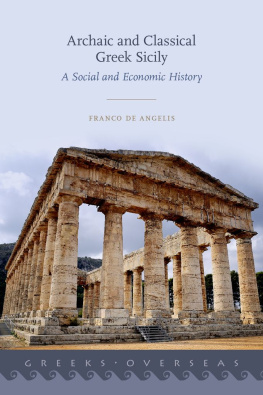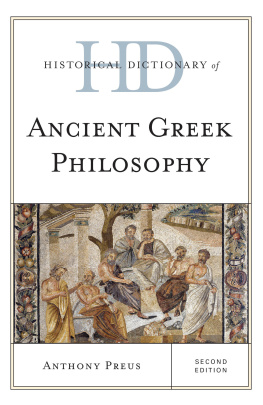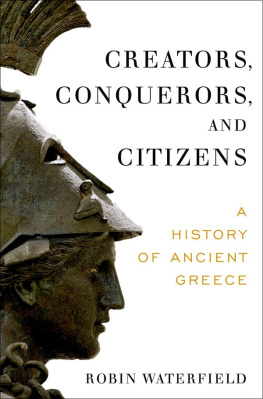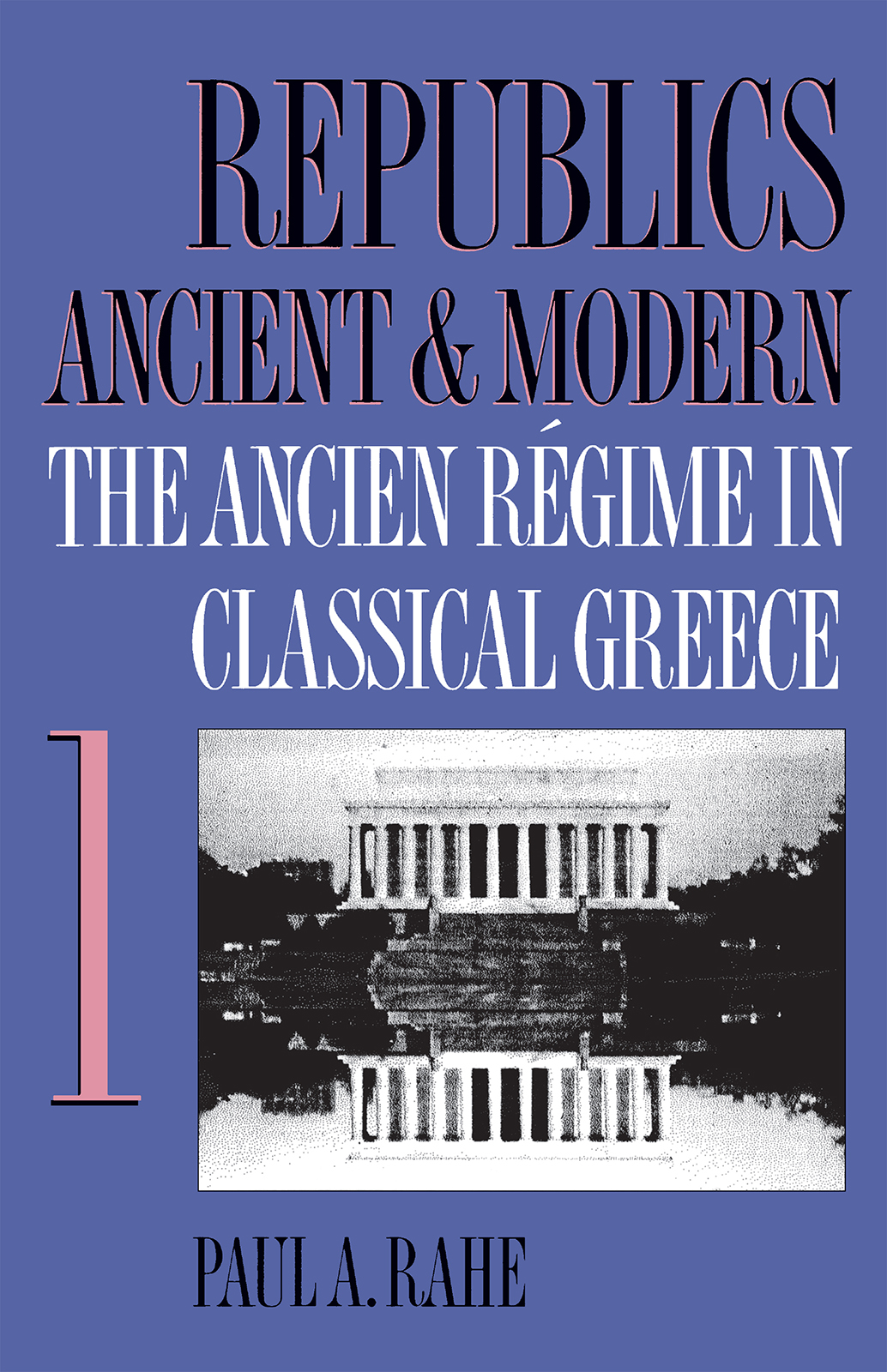Publication of this book was also aided by grants from the Lynde and Harry Bradley Foundation, the Earhart Foundation, and the John M. Olin Foundation.
Rahe, Paul Anthony.
Republics ancient and modern / by Paul A. Rahe.
p. cm.
Includes bibliographical references and index. Contents: v. 1. The Ancien regime in classical Greecev. 2. New modes and orders in Early Modern political thoughtv. 3. Inventions of prudence: constituting the American regime. 1. United StatesPolitics and government17751783. 2. Political scienceUnited States-History18th century. 3. Republicanism History. 4. Political scienceGreeceHistory. I. Title.
ISBN-13: 978-0-8078-4473-1 (pbk. : alk. paper) (v. 1)
ISBN-13: 978-0-8078-4474-8 (pbk. : alk. paper) (v. 2)
ISBN-13: 978-0-8078-4475-5 (pbk. : alk. paper) (v. 3)
The paper in this book meets the guidelines for permanence and durability of the Committee on Production Guidelines for Book Longevity of the Council on Library Resources.
THIS BOOK WAS DIGITALLY PRINTED.
W. G. G. FORREST
Preface
More than ten years ago, I set out to transform my dissertation into a pub-lishable monograph. In the course of making the attempt, I paused in my work, unhappy with the conceptual framework into which I was trying to fit the pieces of the puzzle constituted by late fifth-century Sparta and Athens. I then thought that I would better be able to deal with those scattered fragments of information if I first clarified my own thinking about the character of ancient politics by composing a brief article comparing the constitution of ancient Lacedaemon with that of the modern United States. Had I had any notion at the time of the enormity of the task that I was then taking on, I would no doubt have jettisoned the project right then and there.
When I began that essay in comparative politics, I presumed that I knew virtually all that I needed to know about modern republicanism. I had been born in such a republic. I had grown up there, and I had spent three glorious years in Great Britain, studying ancient history and observing the politics of that remarkable polity at close hand. But, as I pursued my new project, I lost my wayor, rather, discovered that I had never had a very good grasp of where I wasand gradually I came to find strange and mysterious that which had always seemed familiar and obvious. The more I learned about the foundations of modern politics, the less I found that I could depend upon that which I had been taught and had always been inclined to take for granted. And so what began as an attempt to elucidate the character of ancient politics became as much, if not more, a study of modernity.
So, let the reader be warned. This three-volume work is not a summary of the received wisdom concerning the republics of ancient Greece, the political speculation of early modern Europe, and the character of the American founding. Moreover, it is unlikely that the arbiters of intellectual fashion will ever find my thinking congenial. In the three spheres discussed, I have not only broken with the orthodoxy currently reigning in the academy; I have also eschewed the latest trends; and I suspect that many, both in and outside our universities, will find what I have to say unsettling. Thus, for example, where present-minded ancient historians are inclined to place emphasis on the institutions or to stress the sociology of the ancient Greek city and to treat Athens as an exemplar, I present the world of the plls in the light cast by the regime-analysis of Thucydides, Plato, Aristotle, and the like, and I try to show that the ancient tendency to prefer Sparta to Athens made considerable sense. Similarly, where students of early modern political thought now stress the continuity between the ancients and the moderns, I contend that there was a decisive break, disguised somewhat by the need of the latter to circumvent censorship and to make the new thinking more persuasive by presenting it in a fashion designed to soothe rather than shock, and I argue, therefore, that Machiavelli, Harrington, the radical Whigs, and Lord Boling-broke were as much opposed to classical republicanism as Hobbes, Locke, Hume, and Montesquieu. And finally, where American historians debate whether the regime produced by the American Revolution was republican or liberal, ancient or modern, or simply confused, I argue that it was a deliberately contrived mixed regime of sortsliberal and modern, first of all, but in its insistence that to vindicate human dignity one must demonstrate mans capacity for self-government, republican and classical as well. In short, it is my contention that we cannot understand our own situation without thinking a great deal about the politics of antiquity and the speculation of early modern times. Moreover, if I am correct, the modern social science that customarily guides our reflections with regard to this question is itself the chief obstacle to our understanding that which we most need to know. To put it bluntly, these volumes are intended solely for those willing to pause and rethink.
Because I address in these pages questions of permanent public interest, I have tried to make my argument and the evidence on which it is based as accessible as possible to the general reader. To that end, I have cited, where available, English translations of the secondary works which I have found useful, and I have in every case provided translations of the pertinent primary source material. Moreover, where the inclusion of a critical word or phrase in the original language may alert readers familiar with that language to my particular interpretation of the passage or to something going on in the text cited that I have been unable to capture fully in translation, I have provided such information as well. All of the translations, unless otherwise indicated, are my own. In quoting works published in English, I have nearly always retained the original spelling, punctuation, and emphasis. Exceptions are specified in the notes or marked by brackets in the text. In the last note to the introduction to each volume, I have listed books and articles, pertinent to the themes of that volume, which have appeared or come to my attention since the original edition went to press.
Washington, D.C.
18 December 1993
Acknowledgments
En route to publishing these three volumes, I have accumulated a great many debts. Some are exclusively professional. As anyone who peruses my notes will discover, I have read widely in the secondary literature of the three fields covered in this work, and I have learned a great deal from those who have preceded menot least, let me add, from those whose opinions I challenge here. As will be evident, I owe much to the late M.I. Finley and Louis Gernet, to G. E. M. de Ste. Croix, Jean-Pierre Vernant, Pierre Vidal-Naquet, Marcel Dtienne, and to their many students and associates; to John Dunn, Quentin Skinner, J. G. A. Pocock, and those who have succumbed to their influence; to the late Leo Strauss and his many, intrepid admirers; and to the late Hannah Arendt, to Bernard Bailyn, Gordon S. Wood, Joyce Appleby, Lance Banning, and to those who have further elaborated their various arguments.








